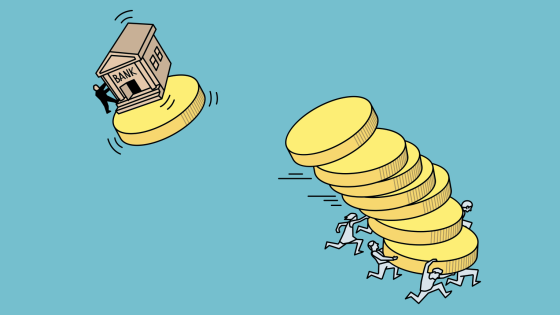The cost of banking crises is usually measured as the loss of output and the fiscal cost of cleaning up the financial system (e.g. Reinhart and Rogoff 2009, Laeven and Valencia 2010). While these may well be substantial, there is also a third potential cost, which is more long-term and difficult to measure. A sweeping crisis could affect people’s confidence in financial stability for decades, leading to more cautious investment behaviour and higher risk premia. A banking crisis could then be a drag on the economy for many years.
Whether or not banking crises leave a long-term impact on expectations and behaviour is debatable. If memories are short, the period needed to revive trust in banks may be only a few years. People might also believe that the crisis was a fluke or that it reflected economic conditions that are no longer at play. But it is also possible that the crisis permanently enters people’s beliefs about the operations of an economy. After all, if it happened once, what can guarantee it will not happen again?
New survey data on banking crisis losses and individual reactions
In a recent paper (Mudd et al. 2010), we use survey data to investigate the long-term impact of a banking crisis on expectations and behaviour. The data were collected in Bulgaria, whose banking system self-imploded in 1996 midway through its transition from communism. Many people experienced losses, sometimes substantial losses, in the value of their savings. More than a decade later, two national household surveys in May 2008 and October 2009 asked respondents about the likelihood of a new banking crisis. They also inquired about peoples’ experiences during the crisis in 1996. These two questions allow us to test how prior experiences with a banking crisis condition expectations of another crisis.
Table 1 shows that, in 2008, following 10 years of economic and financial stability, nearly one-third of respondents ruled out a banking crisis within a year. Yet, 19% believed it “likely” or “very likely”. These data were collected in May, well ahead of the high-profile spread of financial turbulence that started that fall. Of course, Bulgarians may have foreseen the global crisis and a spillover into Bulgaria, but this is unlikely. A more likely explanation is that the results reflect the general level of confidence. Table 1 shows that in the following 2009 survey, taken after the onset of the global financial crisis, expectations of a banking crisis were substantially elevated: only 9% continued to rule out a banking crisis within a year while over 30% of the respondents believed that a banking crisis was likely or very likely.
Table 1. “In your opinion, how likely is it that the Bulgarian banking system will experience a crisis with several banks collapsing and depositors losing some of their savings?” (percent respondents in each category)
| |
2008 Survey
|
2009 Survey
|
|
|
6 months
|
1 year
|
5 years
|
6 months
|
1 year
|
|
Very likely 1
2
3
4
Very unlikely 5
Don’t know/No Answer
|
6.7
6.5
18.0
17.9
31.0
19.9
|
9.6
9.7
17.9
16.5
24.9
21.4
|
13.9
8.9
14.5
12.6
18.5
31.6
|
13.7
13.8
19.9
8.7
11.2
32.7
|
16.6
14.4
16.5
7.1
9.4
36.2
|
|
Total
|
100.0
|
100.0
|
100.0
|
100.0
|
100.0
|
|
Data are from surveys conducted in May 2008 and October 2009 each sampling 1000 households out of a total population of approximately 7 million individuals.
|
The surveys also asked people the following question: “Did you or members of your household lose money during the 1996 crisis?” The surveys were taken more than one year apart and in very different environments – positive growth and stability in 2008 and global financial crisis in 2009. Expectations of a banking crisis changed markedly between these two years. Yet the recollections about 1996 were very similar. Table 2 shows that the percentage of respondents reporting any loss, at a combined 42%, was the same in 2008 and in 2009. Among those, the percentage of respondents who reported a large loss was higher in 2009 (14.5%) compared to 2008 (11.1%) but still very close. Thus, the surveys show that a significant portion of the population experienced a loss and that recollections are consistent over time. [1]
Table 2. “Did you or members of your household lose money during the 1996 crisis?” (percent respondents in each category)
|
|
2008 Survey
|
2009 Survey
|
|
Lost a large amount
Lost some amount
We did not lose anything
Don’t know/No Answer
Total
|
11.1
31.1
48.8
9.0
100.0
|
14.5
27.1
44.7
13.7
100.0
|
This consistency of reported losses is important for resolving two econometric problems: memory bias and reverse causality.
- First, people’s memories of what happened more than a decade ago might not be firm. Memory bias occurs when current events influence their recollections. For example, in 2009 the ongoing crisis might have reminded people of the 1996 crisis leading to more of them reporting a loss than before. The loss experience variable would then vary over time distorting econometric results. Fortunately, despite the changed environment and the change in answers to other questions in the surveys, the recollections of 1996 loss experiences were very similar in the two surveys.
- Second, respondents who expect a crisis might rationalise their expectations by incorrectly reporting a prior loss. In a strict sense, reverse causality is unlikely; an event that occurred well in the past should not be influenced by expectations today. However, respondents who expect a crisis might incorrectly recall that they had experienced a loss to rationalise their beliefs. This does not appear to be the case either.
We therefore estimate the effect of prior losses on expectations and find that respondents who lost a large amount in 1996 are 23 percentage points more likely to expect a crisis in the next five years compared to respondents who did not lose anything. Thus, losses have a strong influence on expectations even 12 years afterwards. Moreover, the size of the loss matters; losing a large amount seems to influence expectations by more.
Our next step investigates whether prior losses influence not only expectations but also behaviour. The October 2009 survey asked respondents if they had withdrawn money from or deposited more money into their bank accounts during the preceding 12 months. Since the financial crisis became fully apparent in fall 2008, this period captures the most turbulent period of the financial crisis. According to the survey, many Bulgarians did not change the amounts they kept on deposit during this time but, of those who did, most reported that they withdrew money.
To investigate whether experiencing a loss 1996 can explain the decision to withdraw money from bank deposits in 2009, we estimate the effect of losses on the likelihood of withdrawing money in a multiple regression that also includes a battery of demographic variables, a measure of change in income over the year, and risk aversion. We find that respondents who had lost a significant amount in 1996 were about 10-15 percentage points more likely to withdraw amounts on deposit in banks than respondents who had not experienced a loss.
Conclusions
Our research finds negative experiences with a banking crisis affect expectations and behaviour for a decade or more. Although the results are based on a survey from Bulgaria, we suppose that the same effect would be observed in other countries where people lost money during a banking crisis. This finding is very much in line with evidence from other papers that the effects of crises are long-lasting (Osili and Paulson 2009, Malmendier and Nagel 2009, Giuliano and Spilimbergo 2009). Our analysis shows a similar and more personal effect with regards to banking crises.
The results suggest that the effect of financial crises on the economy should be studied in a longer-term context.
The impact of losses on expectations and behaviour recorded in the Bulgarian survey provides evidence that household losses during banking crises have real and durable effects and that these effects should be minimised, or else policymakers risk a long-term drag on the economy.
References
Giuliano, Paola, and Antonio Spilimbergo (2009), “Growing up in a Recession: Beliefs and the Macroeconomy”, NBER Working Paper 15321.
Laeven, Luc and Fabian Valencia (2010), “Resolution of Banking Crises: The Good, the Bad, and the Ugly”, IMF Working Paper No. WP/10/146.
Malmendier, Ulrike, and Stefan Nagel (2009), “Learning from Inflation Experiences”, Stanford University working paper.
Mudd, Shannon, Konstantin Pashev and Neven Valev (2010), “The Effect of Loss Experiences in a Banking Crisis on Future Expectations and Behaviour”, The BE Journal of Macroeconomics, 10(1).
Osili, Uno and Anna Paulson (2009), “Bank Crises and Investor Confidence”, Network Financial Institute (NFI) working paper no. 2009-WP-01.
Reinhart, Carmen and Kenneth Rogoff (2009), “The Aftermath of Financial Crises”, NBER Working Paper 14656.
[1] This large percentage is consistent with other findings that report that close to 50% of the value of bank deposits were lost in 1996 (e.g. Berlemann et al. 2002).





